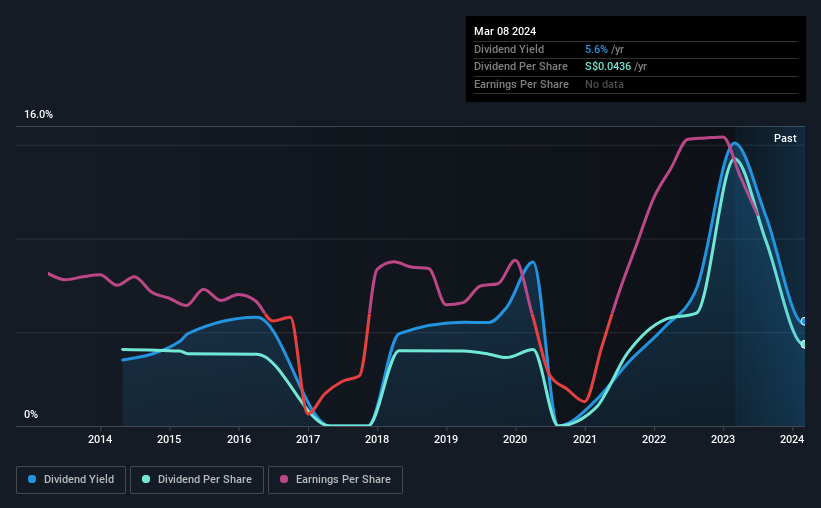Uni-Asia Group (SGX:CHJ) Is Due To Pay A Dividend Of $0.022
The board of Uni-Asia Group Limited (SGX:CHJ) has announced that it will pay a dividend on the 31st of May, with investors receiving $0.022 per share. The yield is still above the industry average at 5.6%.
Check out our latest analysis for Uni-Asia Group
Uni-Asia Group's Earnings Easily Cover The Distributions
Impressive dividend yields are good, but this doesn't matter much if the payments can't be sustained. Before making this announcement, Uni-Asia Group was easily earning enough to cover the dividend. This means that most of what the business earns is being used to help it grow.
Looking forward, earnings per share could rise by 29.5% over the next year if the trend from the last few years continues. Assuming the dividend continues along recent trends, we think the payout ratio could be 56% by next year, which is in a pretty sustainable range.
Dividend Volatility
While the company has been paying a dividend for a long time, it has cut the dividend at least once in the last 10 years. The annual payment during the last 10 years was $0.0306 in 2014, and the most recent fiscal year payment was $0.0327. Its dividends have grown at less than 1% per annum over this time frame. We're glad to see the dividend has risen, but with a limited rate of growth and fluctuations in the payments the total shareholder return may be limited.
The Dividend Looks Likely To Grow
Given that the dividend has been cut in the past, we need to check if earnings are growing and if that might lead to stronger dividends in the future. It's encouraging to see that Uni-Asia Group has been growing its earnings per share at 29% a year over the past five years. Earnings per share is growing at a solid clip, and the payout ratio is low which we think is an ideal combination in a dividend stock as the company can quite easily raise the dividend in the future.
Uni-Asia Group Looks Like A Great Dividend Stock
In general, we don't like to see the dividend being cut, especially when the company has such high potential like Uni-Asia Group does. The cut will allow the company to continue paying out the dividend without putting the balance sheet under pressure, which means that it could remain sustainable for longer. All of these factors considered, we think this has solid potential as a dividend stock.
Investors generally tend to favour companies with a consistent, stable dividend policy as opposed to those operating an irregular one. Meanwhile, despite the importance of dividend payments, they are not the only factors our readers should know when assessing a company. For example, we've picked out 4 warning signs for Uni-Asia Group that investors should know about before committing capital to this stock. If you are a dividend investor, you might also want to look at our curated list of high yield dividend stocks.
Have feedback on this article? Concerned about the content? Get in touch with us directly. Alternatively, email editorial-team (at) simplywallst.com.
This article by Simply Wall St is general in nature. We provide commentary based on historical data and analyst forecasts only using an unbiased methodology and our articles are not intended to be financial advice. It does not constitute a recommendation to buy or sell any stock, and does not take account of your objectives, or your financial situation. We aim to bring you long-term focused analysis driven by fundamental data. Note that our analysis may not factor in the latest price-sensitive company announcements or qualitative material. Simply Wall St has no position in any stocks mentioned.

 Yahoo Finance
Yahoo Finance 
